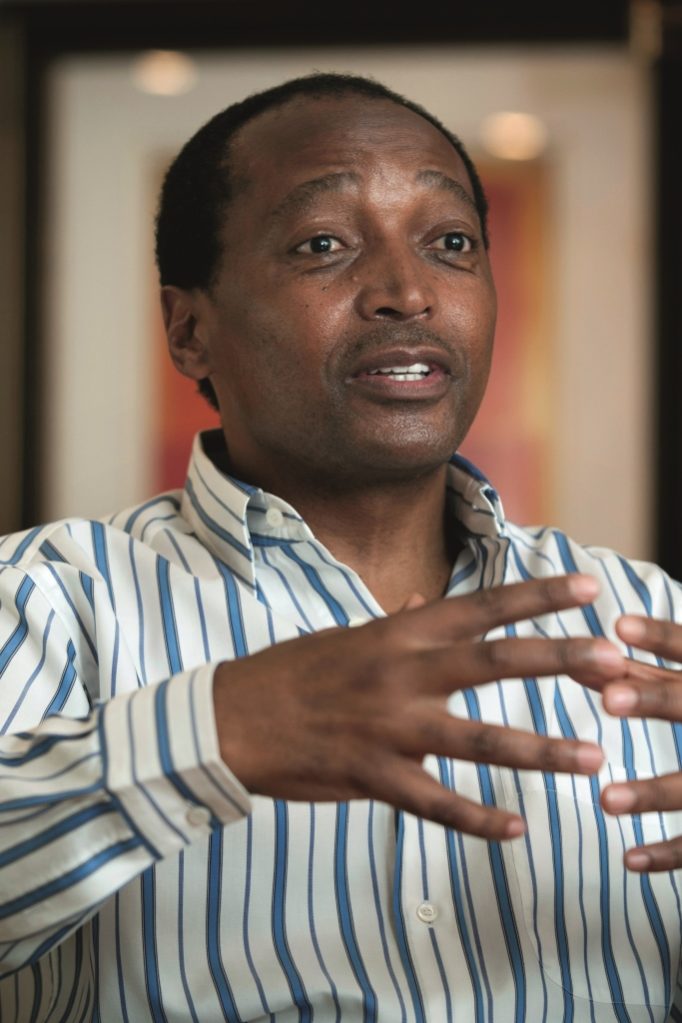Umuntu ngumuntu ngabantu—this age-old Zulu proverb explains the spirit of ubuntu; translated it reads “A person is a person through others” but many paraphrase it to “I am because we are”.
You’ll find Ubuntu in any close-knit community where neighbors help each other with anything from sharing sugar and bread to babysitting and mourning. Ubuntu in business is called philanthropy. The Latin origins of the word means the love of humankind; the desire to promote the welfare of others, mostly, through the generous donation of money to good causes.
In a historic press event in a plush Sandton hotel in Johannesburg, South Africa’s richest black man, Patrice Motsepe announced that he and his wife, Precious, would donate half of their family fortune to philanthropic causes during their lifetime and beyond.
The room was full, from clergymen and traditional leaders to South African businesses’ top brass as well as ministers and union leaders. Among them were Pamodzi CEO, Ndaba Ntsele; Jessica Motaung, daughter of Kaizer Chiefs FC owner Kaizer Motaung; chairman of Shell SA, Bonang Mohale; Zulu nation Monarch, King Goodwill Zwelithini; basic education minister, Angie Motshekga and Archbishop Tutu’s daughters to name a few.

Patrice Motsepe, Johannesburg; 19 August 2011 – Photo by Brett Eloff
“We want to build a track record where ordinary South Africans feel we’re making a humble contribution,” says the 8th richest African.
He assured the audience that he would make sure his children continued the tradition.
The move put the Motsepes on a list of elites who have pledged to give a majority of their wealth to philanthropy. They are the first Africans to join the Giving Pledge, founded by Bill Gates and Warren Buffett in 2010. Today, it has nearly 100 members including New York mayor, Michael Bloomberg; world-famous designer, Diane von Furstenberg; Facebook founder, Mark Zuckerberg and PayPal co-founder, Elon Musk.
Is this pledge a new trend in business or just an age-old tradition of ubuntu under a new light?
This is not the Motsepes’ first contribution, in 1999 they started the Motsepe Foundation, which to date has donated around R40-R50 million ($4.5-5.6 million) to business development. Last year alone they gave R20 million ($2.3 million) to major churches in South Africa. They say this move is just an acceleration of what they’ve established.
While the Motsepes have had a lucky turn of fortune, it wasn’t always that way.
“There were times when we had nothing… When I came back from America we had so many loans that we couldn’t pay our children’s school fees [and] we had to send them to good schools. But there was always belief because we come from parents who succeeded during the years when there was no black economic empowerment,” says Motsepe.
But many ask themselves whether other African entrepreneurs and companies will follow in Motsepe’s footsteps.
Philip Fauré, head of Citadel Philanthropy Advisors, says there are many wealthy entrepreneurs who are philanthropists but prefer to remain under the radar.
“Africans are more private than Americans,” says Fauré.
He also says that they avoid requests for money and security risks by doing things privately. However, he is quick to emphasize the difference between philanthropy and charity by using a fishing analogy—philanthropy is teaching one how to fish.
“Charity is never going to go away; aid is not the solution,” says Fauré.
He also says that philanthropy is a major industry worldwide, mostly in the States. He hopes that more prominent South African families will give publically.
There are a number of other African billionaires who are active philanthropists.
In 2012 alone, Johann Rupert, the third richest African and CEO of luxury goods group Richemont, gave his R3.6 million ($406,700) annual salary to charity. The Oppenheimers—the second richest family in Africa—donated R1 billion ($112.9 million) to support education in South Africa. In Nigeria, Africa’s richest man, Aliko Dangote, gave away around $35 million and Zenith Bank founder, Jim Ovia, gave away an estimated $6.6 million. And Zimbabwe’s richest man, Strive Masiyiwa, gave away around $6.4 million.
According to wealth management company Galileo Capital, if Motsepe plans to give away half of his wealth—bearing in mind his current net worth of $2.65 billion, interest and inflation—he will give away around $40 million annually to his philanthropic missions.
